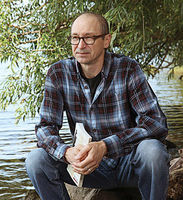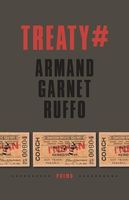Read Three Powerful Poems from Treaty# by Armand Garnet Ruffo
What does the word treaty mean? Deceptively simple, it's a word with great weight and Armand Garnet Ruffo spreads the word and its meaning open in his powerful new poetry collection Treaty# (Wolsak & Wynn).
Observational, wise, and diamond-sharp, the poems investigate relationships both personal and macro, from individual connections to the titular Indigenous treaties in Canada. Writing over the past with its misrepresentations and inaccuracies, Ruffo imagines new ways to bear witness and communicate, all while maintaining a deep link to what has come before.
Original, important, and arresting, it's a collection that will deeply impact readers, and we are incredibly proud to present an exclusive excerpt from Treaty# here today courtesy of Wolsak & Wynn. In three poems, selected by Ruffo, we get glimpse of this exciting new work.
Excerpt from Treaty# by Armand Garnet Ruffo:
On the Day the World Begins Again
On the day the world begins again
will it be the strongest animal
the swiftest bird
or the tiniest insect
that carries the news to humankind
announces rebirth in a roar
in a squeak or maybe in silence?
On the day the world begins again
will luminous light
rise from parting clouds
in unquestionable power
and refract a miraculous prism of colour
while the tallest white pine announces peace
in a sprinkling of communion?
On the day the world begins again
will those suspended behind bars
in and between grey ugliness
in their deadened shouts of protest
float beyond their circle of cigarette burns
and crude tattoos
beyond their sharp cries of where
they are and wish they were?
On the day the world begins again
will their re/imagined selves
the shape of thought
the shape of prayer
bend like molten steel
in the fire at the centre of the human heart
Will they rise beyond themselves
and find their way home
On the day the world begins again
will the cages open for them?
Dinner Party
Substratum of living
room conversation
pleasant company
books and a fireplace,
safe and almost in
the affairs of the day:
gender, war, politics,
reconciliation, tv
a fractured shift
and a shadow jack pine
scrapes its perpetual
one-pitch note against
a single-pane window
as a dinner plate zings
and shatters, a white
towel soaks up blood,
and what was that?
Your CanLit News
Subscribe to Open Book’s newsletter to get local book events, literary content, writing tips, and more in your inbox
another shift of head
and our gracious host
stands before us
announcing it’s time,
everyone rising on cue
like the sumptuous aroma
into a setting for six,
candles and fine china,
brimming anticipation
while steps away a fault line
you take heed to step across:
temporal simulacrum
precambrian rock-cut
arboreal town
precarious shack
deceptive home
leaking shadow
across the easy smiles
Terra Nullius Lingus(1)
To be or not to be terra nullius. To be or not to be human on terra nullius
Today or not today we stand together dis(re)membered in terra nullius
Gitksan Carrier Cree
Assiniboine Dakota Ais Alsea
Wyandot Adai Inuinnaqtun Lillooet
Beothuk Pentlatch Tsetsaut Slavey Haisla
Chimariko Kathlamet Iowa-Oto Yurok Nisga’a
Miluk Powhatan Calusa Wappo Chehalis Mohawk
Mohegan Mobilian Tutelo Etchemin Chitimacha Han
Biloxi Shinnecock Obispeño Atakapa Eyak Michif Piro
Nanticoke Karkin Pamlico Narragansett Heiltsuk Seneca
Mandan Hanis Klallam Cowlitz Kato Kitsai Tututni Cayuse
Cheraw Mahican Purisimeño Yoncalla Twana Chimariko
Knwalhioqua-Clatskanie Kalapuyan Costanoan Tsetsa
Yaquina Atsina Molala Barbareño Atsugewi Karankawa
Mattole Squamish Timucua Miwok Kathlamet Wichita
Tillamook Ofo Natchez Cruzeño Esselen Siuslaw
Ventureño Umpqua Tsetsaut Athabaskan Oneida
Malecite-Passamaquoddy Takelma Mohawk
Apalachee Penobscot Potawatomi Ojibwe
Powhatan Beaver Tonkawa Yana
Bella Coola Cayuga Sarcee
Chilcotin Tlingit Tagish
To have or not to have be(ing)longing on terra nullius
Today in our let me bow my head in conjugation in our for our terra nullius lingus:
indanama'etawaa – nindanama'etawaa – nidanama'etawaa –
odanama'etawaan – anama'etawaad – enama'etawaad –
anama'etaw
(1) In North America, since 1600 at least fifty-two Indigenous languages have become extinct while many others are threatened.
____________________________________
This excerpt is taken from Treat# copyright © 2019 by Armand Garnet Ruffo. Reproduced with permission from Wolsak & Wynn.
Armand Garnet Ruffo was born and raised in northern Ontario and draws upon his Ojibwe heritage for much of his writing. A multi-genre writer, he is the author of Grey Owl: The Mystery of Archie Belaney and Norval Morrisseau: Man Changing into Thunderbird, a finalist for the 2015 Governor General’s Literary Awards. His latest collection of poetry is The Thunderbird Poems. Other projects include “Sounding Thunder: The Song of Francis Pegahmagabow,” a musical drama that premiered in the summer of 2018, and “On the Day the World Begins Again,” a short film about Indigenous incarceration that will premiere in October 2018. His writing most recently appeared in ARC Poetry, GRANTA's Canada issue, EVENT and 150, Canada’s History in Poetry (Nimbus Publishing). Ruffo is the recipient of a Honourary Life Member Award from the League of Canadian Poets and an inaugural Mayor’s Arts Award from the City of Kingston. He is currently the Queen’s National Scholar in Indigenous Literature at Queen’s University in Kingston. He lives in Kingston, Ontario.






